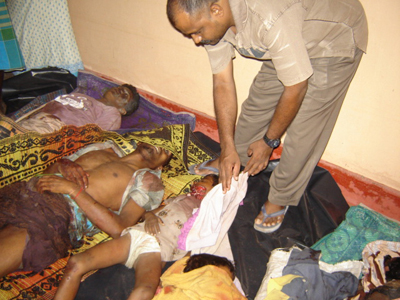Ilankai Tamil Sangam30th Year on the Web Association of Tamils of Sri Lanka in the USA |
||||
 Home Home Archives Archives |
Fig LeafTamil Guardian editorial, April 11 2007
Rights monitoring is pointless without firm international action The Presidency of Mahinda Rajapakse has primarily been one of renewed war in the Northeast and repression in the south. Whilst the Tamils have borne the brunt of state violence in the past 18 months, the tide of rabid Sinhala nationalism that has emerged in that time has cowed the southern liberals and the Left. Nothing has contributed more to the all-pervasive sense of fear than the ceaseless killings and disappearances that have come to mark President Rajapakse’s rule above anything else. Of course, the ‘shadow war’ began littering Sri Lanka’s roadsides and fields with bound and mutilated corpses well before ‘Mahinda Chinthana’ became the state philosophy. But human rights abuses became common place only afterwards.
What has been striking, however, is the feeble response of the international community, led by the West. The 2002-3 Norwegian peace talks were heavily laced with the liberal ethos of human rights. Indeed the pressing humanitarian needs of hundreds of thousands of Tamils – the stated primary concern of the LTTE – were marginalized by the internationally backed peace process whilst human rights protection was held aloft as the magic pill for Sri Lanka’s ethnic crisis (a quick read of the joint statements issued after the last four of the six rounds will illustrate our point). So what happened to that international commitment to human rights when President Rajapakse resumed the war? The international indifference to the cascade of bloodied corpses speaks volumes: the priority is to ensure Sri Lanka defeats the LTTE and ends the Tamil challenge to the state. Which is why, apart from occasional handwringing, there is no credible effort to restrain the Sri Lankan state. But amid this inaction, a curious international campaign is underway: a call to establish an international human rights monitoring body. For much of the past year a coalition of international and local human rights groups, including the recently unfairly vilified Amnesty International, and activists have been agitating for such an independent body. They argue, correctly, that the Sri Lankan state cannot be entrusted with monitoring. This pressure compelled President Rajapakse last year to appoint a Commission of Inquiry (COI) and accept the appointment of a panel of international observers, the International Independent Group of Eminent Persons (IIGEP). A number of international actors - including the European Union and India - have appointed prominent individuals to it. But that has been the sum total of international action. The COI itself is an eyewash, as any seasoned observer of Sri Lanka’s politics will attest. The IIGEP has been inaugurated, but its profile is so low-key as to be almost invisible. For the past two decades, the primary driver for continuing abuses by the state armed forces has been the heavily institutionalized culture of impunity in Sri Lanka. In short, the security forces are certain that anything goes in the name of national security. Their confidence is entirely justified. Not only is the Sri Lankan state unconcerned, provided the war is won; neither, really, is the international community. Whilst doing nothing else and simply appointing an individual to the IIGEP, the leading states involved in Sri Lanka have effectively (and knowingly) provided Sri Lanka with a fig leaf behind which to approach international fora like the UN Human Rights Council. In the meantime, the campaign to establish international human rights monitoring meanders along, making much noise but little progress against effective resistance by the Sri Lankan state. This resistance has less to with Sri Lanka’s arguments (indeed the country with the second most recorded disappearances after Iraq doesn’t really have a case) than lacklustre international commitment to protecting rights against this state. In a despicable appeal to the Sinhala chauvunism now riding high in the south, some advocates such as Human Rights Watch (HRW), have even argued that a monitoring mechanism would be primarily be useful in cornering the LTTE. The assumption that the Tamil liberation movement is antithetical to international human rights protection is erroneous. The central Tamil grievance is state oppression. For decades we have argued ourselves hoarse that it is the slow genocide by the state that we are resisting. Any mechanism that will effectively restrain the Sinhala dominated state from continuing its violence against our people would be welcome. As such, an effective independent monitoring mechanism would be an important first step. But beyond monitoring lies the true problem: the lack of commitment by leading international states to restrain friendly states crushing rebellious peoples, no matter how brutally. |
|||
|
||||
